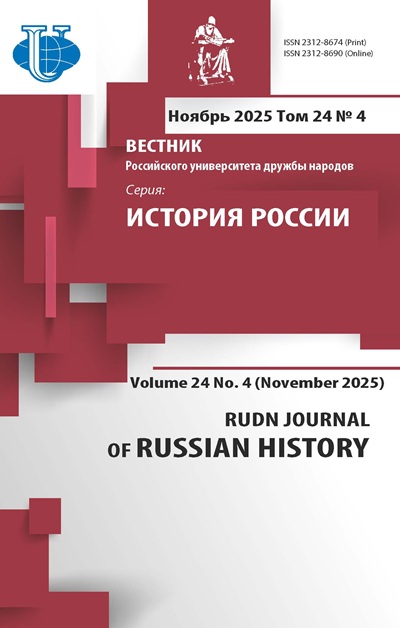ВЛАСТЬ И ВЫСШЕЕ СОСЛОВИЕ РОССИЙСКОЙ ИМПЕРИИ В ПЕРИОД РЕФОРМ: ПРОБЛЕМЫ ВЗАИМОДЕЙСТВИЯ
- Авторы: Селиверстова Н.М.1
-
Учреждения:
- Российский химико-технологический университет им. Д.И. Менделеева
- Выпуск: № 4 (2014)
- Страницы: 25-35
- Раздел: СТАТЬИ
- URL: https://journals.rudn.ru/russian-history/article/view/4249
- ID: 4249
Цитировать
Полный текст
Аннотация
Статья раскрывает проблемы взаимоотношений власти и высшего сословия Российской империи в период реформ 60-70 гг. XIX в. Автор прослеживает, как менялись позиции дворянства по отношению к политике правительства начиная с освобождения крестьян и до конца правления Александра II; анализирует способы реакции власти на сигналы, посылаемые ей со стороны высшего сословия. Активно привлекая дворянство к реализации реформ на местах, власть долгое время отказывалась рассматривать вопрос об участии его в создании и функционировании центрального представительного органа власти.
Об авторах
Наталья Матвеевна Селиверстова
Российский химико-технологический университет им. Д.И. Менделеева
Email: nseliverstova@mail.ru
Кафедра истории и политологии
Список литературы
- Литвак. Б.Г. Переворот 1861 года в России: почему не реализовалась реформаторская альтернатива. - М., 1991. - С. 195.
- Российский государственный исторический архив (РГИА). - Ф. 982. - Оп. 1. - Д. 72.
- Там же. - Л. 1 об.
- РГИА. - Ф. 982. - Оп. 1. - Д. 72. - Л. 1 об.
- Там же. - Л. 2.
- Дудзинская Е.А. Славянофилы в пореформенной России. - М., 1994. - С. 25.
- Чернуха В.Г. Альтернативная программа имперской политики России эпохи великих реформ // Власть, общество и реформы в России: история, источники, историография. - СПб., 2007. - С. 297-298.
- Мемуары графа С.Д. Шереметева. - М., 2004. - Т. 1. - С. 139-140.
- РГИА. - Ф.1092. - Оп.1. - Д. 169. - Л. 1.
- РГИА. - Ф.1092. - Оп.1. - Д. 169. - Л. 1 об.
- РГИА. - Ф.1092. - Оп.1. - Д. 169. - Л. 2.
- Кавелин К.Д. Наш умственный строй. - М., 1989. - С. 157.
- Дневник П.А. Валуева, министра внутренних дел. Т. 1. 1861-1864. - М., 1961. - С. 117.
- Чернуха В.Г. Внутренняя политика царизма с середины 50-х до начала 80-х гг. XIX в. - Л., 1978. - С. 40.
- Шомпулев В.А. Записки старого помещика. - М., 2012. - С. 136.
- Переписка Ю.Ф. Самарина с баронессою Э.Ф. Раден. 1861-1876. - М., 1893. - С. 39-40.
- Уварова П.С. Былое. Давно прошедшие счастливые дни. - М., 2005. - С. 77.
Дополнительные файлы















